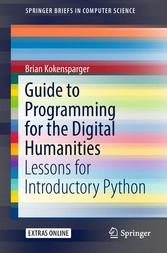Suchen und Finden
Service

Guide to Programming for the Digital Humanities - Lessons for Introductory Python
Brian Kokensparger
Verlag Springer-Verlag, 2018
ISBN 9783319991153 , 93 Seiten
Format PDF
Kopierschutz Wasserzeichen
Geräte
As an introduction to programming for the Digital Humanities (DH), this book presents six key assignments oriented on DH topics. The topics include Computing Change Over Time (calculating burials at a historic cemetery), Visualizing Change Over Time (visualizing the burials at the historic cemetery), Textual Analysis (finding word frequencies and 'stop words' in public domain texts), XML Transformation (transforming a simplified version of XML into HTML styled with CSS), Stylometry (comparing the measured features of graphic images), and Social Network Analysis (analyzing extended relationships in historic circles). The book focuses on the practical application of these assignments in the classroom, providing a range of variations for each assignment, which can be selected on the basis of students' specific programming background and skills; 'atomic' assignments, which can be used to give students the experience they need to successfully complete the main assignments; and some common pitfalls and gotchas to manage in the classroom. The book's chief goals are to introduce novice computer science (CS) students to programming for DH, and to offer them valuable hands-on experience with core programming concepts.
Brian Kokensparger is a faculty member in Computer Science at Creighton University, where he teaches introductory programming courses, as well as courses in database design, computer organization, and software engineering. Brian is also a faculty mentor in Creighton's Digital Maximilian-Bodmer Archive digital humanities project, and works with the Prospect Hill Cemetery board in digitization and analysis of its burial permit records.
As an introduction to programming for the Digital Humanities (DH), this book presents six key assignments oriented on DH topics. The topics include Computing Change Over Time (calculating burials at a historic cemetery), Visualizing Change Over Time (visualizing the burials at the historic cemetery), Textual Analysis (finding word frequencies and 'stop words' in public domain texts), XML Transformation (transforming a simplified version of XML into HTML styled with CSS), Stylometry (comparing the measured features of graphic images), and Social Network Analysis (analyzing extended relationships in historic circles).
The book focuses on the practical application of these assignments in the classroom, providing a range of variations for each assignment, which can be selected on the basis of students' specific programming background and skills; 'atomic' assignments, which can be used to give students the experience they need to successfully complete the main assignments; and some common pitfalls and gotchas to manage in the classroom.
The book's chief goals are to introduce novice computer science (CS) students to programming for DH, and to offer them valuable hands-on experience with core programming concepts.
Shop


